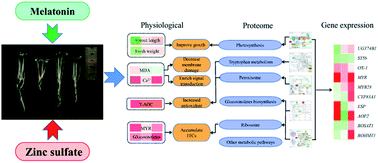iTRAQ-based proteomic and physiological analyses of broccoli sprouts in response to exogenous melatonin with ZnSO4 stress†
Abstract
Exogenous melatonin (10 μM) enhances ZnSO4 (4 mM) stress tolerance and regulates the isothiocyanate content of broccoli sprouts. Nevertheless, the molecular mechanism underlying the role of melatonin in isothiocyanate metabolism under ZnSO4 stress is unclear. The effects of exogenous melatonin on growth and isothiocyanate metabolism in broccoli sprouts under ZnSO4 stress during germination were investigated by physio-biochemical methods, quantification of relative gene expression levels, and the isobaric tags for the relative and absolute quantitation (iTRAQ) labelling technique. Compared with sprouts under ZnSO4 stress alone, sprout length, fresh weight and free calcium content increased significantly in sprouts under ZnSO4 stress plus melatonin treatment while electrolyte leakage and malonaldehyde content decreased. The glucosinolate content and myrosinase activity also significantly increased in sprouts under ZnSO4 stress plus melatonin treatment compared with the control, and thus the isothiocyanate and sulforaphane content increased markedly. Meanwhile, the expression of glucoraphanin biosynthesis genes, such as MYB28, CYP83A1, AOP2, BoSAT1, and BoHMT1 was significantly induced by melatonin in sprouts under ZnSO4 stress. Furthermore, compared with sprouts under ZnSO4 stress alone, a total of 145 proteins in broccoli sprouts under ZnSO4 stress plus melatonin treatment showed differential relative abundances. These proteins were divided into 13 functional classes and revealed that pathways for sulfur metabolism, glucosinolate biosynthesis, selenocompound metabolism, biosynthesis of secondary metabolites and peroxisome were significantly enriched. The present study indicates that exogenous melatonin alleviates the adverse effects of ZnSO4 stress on sprout growth and promotes glucoraphanin biosynthesis and the hydrolysis of glucoraphanin to form isothiocyanates in broccoli sprouts.



 Please wait while we load your content...
Please wait while we load your content...